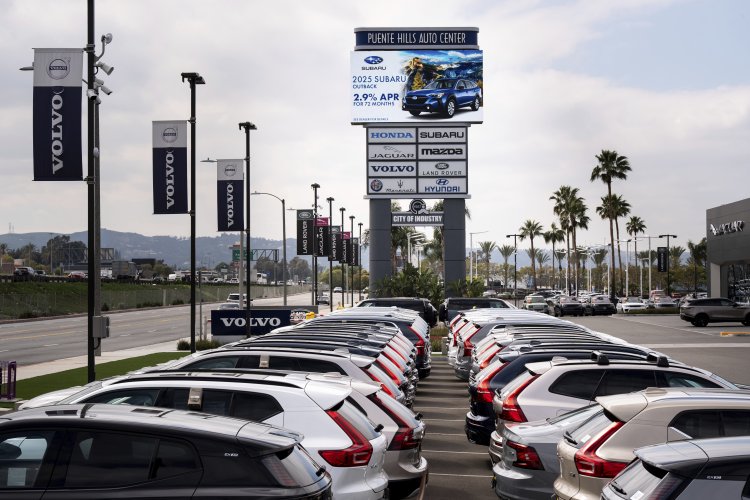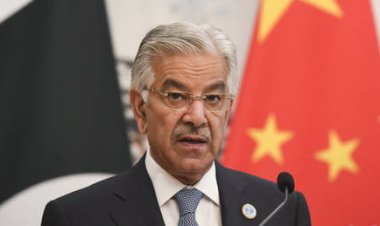'A Congressman in the Auto Industry Foresees Pain, Then Acceptance of Soaring Prices': 'There'll Be a Shock'
Rep. Mike Kelly describes this as a long-overdue "wake-up call" regarding the detrimental trade imbalance affecting American jobs.

The Pennsylvania Republican, first elected to Congress in 2010 and owner of five car dealerships, represents a district that spans from the suburbs north of Pittsburgh to the shores of Lake Erie. His constituents supported Trump by over 27 percentage points in 2024, appreciating his campaign promise to lower prices. However, during weekend grocery store visits, Kelly encounters constituents worried about potential cuts to government benefits and the persistently high prices of food.
With his automotive business roots tracing back to a family Chevrolet dealership from the 1950s, Kelly is preparing for an uptick in complaints about pricing as tariffs come into play. Research suggests these tariffs could lead to price increases of $6,400 to $10,000.
“There’ll be a shock,” Kelly stated in an interview with PMG Magazine in his Capitol office. “And then there’ll be people, the more they see it, the more they become accustomed to it and say, ‘OK, fine, I see what we’re trying to do here.’”
Kelly believes Trump’s strategy serves as a necessary “wake-up call” to prevent America from continuing to lose businesses and jobs to foreign competitors.
The discussion turned to electric vehicle (EV) initiatives, where Kelly had previously held the last administration accountable due to concerns about the higher average cost of EVs compared to traditional gasoline vehicles. With many estimates indicating that the new tariffs could further increase car prices by as much as $10,000, Kelly expressed that the impact on car dealerships and consumers is significant.
“The consumer will make a decision on what’s viable and what’s sellable,” he remarked. “When they stop buying, you watch the prices drop. I don’t know what it’s going to do to sales.”
He noted a particular concern for the used car market, which saw a surge in prices during Covid as people turned to pre-owned vehicles when new car inventory dwindled. “It’s all supply and demand,” he explained, emphasizing the determining role of consumer demand.
Addressing the worries of constituents who may struggle with rising car prices, Kelly pointed out the fundamental economics at play. People frequently approach him in stores, where they express frustrations about high prices for essentials, like groceries. While he acknowledges their grievances, he reminds them, “We don’t control markets.”
When asked about the patience consumers might have before expressing dissatisfaction with high prices, Kelly indicated it largely depends on the financial impact on their wallets. “A lot of it has to do with how the media plays it,” he noted, recognizing that narratives shape public perceptions.
He affirmed, however, that Trump has a clear objective: to encourage more domestic manufacturing. He believes the initial difficulties brought on by tariffs may ultimately lead to greater acceptance among the public as they adjust to the new landscape.
“I think the president says it’s going to be tough for a little bit,” Kelly stated, recognizing the long-term benefits of bringing jobs back to America. He reflected on historical market shifts and the importance of domestic production, suggesting that economic security is intertwined with national security.
As economic conditions fluctuate, Kelly believes that the president’s policies serve to enlighten the public on the realities of international trade dynamics, emphasizing that some foreign competitors prioritize their market share over fair play.
When discussing potential disruptions at the dealership level, Kelly acknowledged a pervasive sense of anxiety among dealers. He emphasized the need to stock inventory that resonates with the purchasing power of local families.
In the context of ongoing policies, including a proposed tax credit for buying American cars, Kelly expressed skepticism. He warned against eliminating revenue streams necessary to balance the budget, especially in light of existing national debt.
His views on the EV tax credit were similarly clear: “If you want to buy an EV, fine, but don’t ask some poor son of a bitch that’s working two jobs to put food on the table to subsidize it,” he asserted.
Ultimately, Kelly believes the current administration is triggering necessary discussions about job loss and market dynamics in a global economy. He feels a significant shift is taking place, prompting Americans to confront the realities of globalization and their impact at home. “I just think that, if nothing else, what the president’s doing now is a wake-up call,” he concluded.As the conversation shifted back to the effects of tariffs and the broader implications for the American economy, Kelly highlighted the urgent need for the U.S. to reassess its relationship with global markets. He argued that the steady flow of jobs overseas has not only impacted economic stability but has also eroded the manufacturing base that once defined American industry.
“Look at the towns,” he said. “The steel mills, the factories that once thrived, now stand as reminders of what we’ve lost.” He conveyed a sense of urgency, urging that economic revitalization hinges on a commitment to domestic production.
Kelly also acknowledged that while immediate changes might be uncomfortable, the long-term goal of restoring American jobs and industries is worth the short-term pain. He believes that the public will eventually recognize the merit in prioritizing homegrown manufacturing over cheaper foreign imports.
“We’ve been too complacent,” he remarked. “People need to realize that our open-door policy towards foreign markets has consequences. We’ve allowed ourselves to become reliant on others while neglecting our capabilities.”
He pointed to specific industries, such as automotive and steel, where policy changes could invigorate job growth. “We need to ensure that we're not just consumers in this economy but that we also have a stake in production,” he added, emphasizing the dual role of Americans as both buyers and builders.
As the tariffs commence, dealers like Kelly will need to adapt to changing consumer behavior that accompanies rising prices. He underscored the importance of understanding the local market's dynamics. “Dealers will need to adjust inventory and strategies,” he explained, indicating that a closer connection to consumer needs will be crucial in navigating these turbulent waters.
However, Kelly remains cautiously optimistic about the future. He envisions a potential resurgence of manufacturing in the U.S. as businesses and consumers alike respond to these new realities. “As people become aware and adapt, there is a significant opportunity for innovation and growth,” he stated confidently.
He also addressed potential criticisms that come with adjusting to increased car prices, stressing that education and transparency will be vital. “Consumers need to understand what’s at stake,” he noted. “If we empower them with information, they can make informed choices about what they buy and why they buy it.”
Recognizing the varied concerns among his constituents, Kelly is committed to serving as a bridge between them and policymakers. He believes it’s vital to stay engaged, not just in the halls of Congress but also in the communities he represents. “One of the most important things we can do is listen,” he asserted. “You have to hear what people are saying and respond accordingly.”
As tariffs begin to reshape the automotive landscape, the real test will be how well lawmakers and businesses manage this transition. Kelly is prepared for a bumpy road but believes that the eventual destination—greater independence and a revitalized economy—will prove worth the effort. “This is about creating a future where our people and our businesses can thrive again,” he concluded. “We owe it to the next generation to get this right.”
As dealers, manufacturers, and consumers navigate these changes, the story will continue to unfold, revealing the complexities of balancing protectionism with global trade realities. For Kelly, the stakes couldn't be higher, and the time for action is now.
Ian Smith for TROIB News
Find more stories on Business, Economy and Finance in TROIB business












